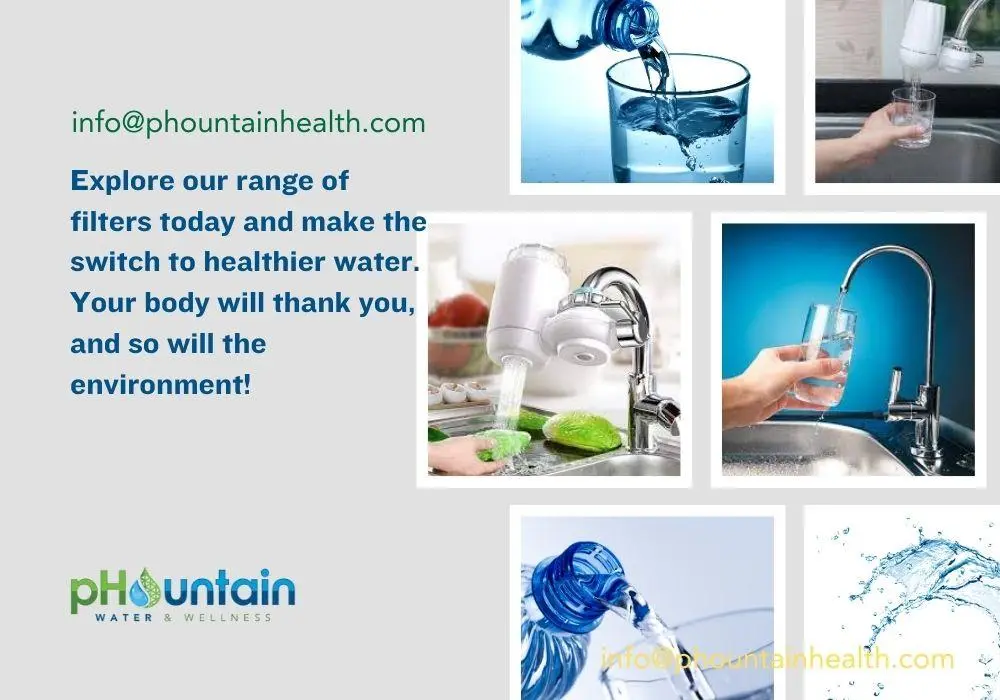
Filtered Tap Water vs. Tap Water: Understanding the Key Differences and Benefits
There’s more at stake when choosing between filtered and unfiltered tap water than just taste. The quality of drinking water affects your health, the environment, and even your wallet. In this article, we’ll explore the debate of tap water vs filtered water, looking closely at what makes them different and which option is better for you. So, if you’ve ever wondered whether investing in a water filter is worth it, keep reading to find out.
Why Should You Care About Your Drinking Water Quality?
Water is essential for life, but not all water is created equal. When you drink unfiltered tap water, you may be consuming harmful substances like chlorine, lead, and bacteria. On the flip side, filtered water can improve the taste and safety of your water, ensuring it’s completely free from most contaminants.
But let’s break down what’s in your tap water and why filtering it could be a game changer. When properly hydrated with purified water, your body can more easily transport and process these nutrients and minerals, giving your body the benefits and nutrition it deserves.
What’s In Tap Water?
Tap water undergoes several treatment processes before reaching your faucet, but that doesn’t mean it’s perfect. Most tap water contains small amounts of heavy metals, chlorine, fluoride, and other impurities.
While these substances are usually at levels deemed safe by regulatory bodies, they can still pose health and safety risks over time, especially if consumed in large quantities.
In addition, the pipes that deliver water to your home’s faucet can be a source of contamination. Older plumbing systems may leach lead, copper, or mercury into the water supply. Even if the water treatment plant does a great job, these contaminants can sneak into your water right before it flows out of your faucet.
The Role Of Water Filters In Removing Impurities
Water filters are designed to remove these harmful contaminants, making water safer and better tasting. However, not all filters are created equal. Different types of filters and filtration systems target different impurities:
- Activated Carbon Filters: These are effective at removing chlorine, bad smells, and taste issues from your water. They can also remove heavy metals and volatile organic compounds (VOCs).
- Reverse Osmosis: This type of filtration is more thorough, removing a wide range of contaminants, including lead, fluoride, and bacteria. However, it also strips the water of beneficial minerals like calcium and magnesium.
- Distillation Systems: These systems work by boiling water and then condensing the steam into liquid form, leaving most impurities behind. However, the process can be energy-intensive and slow.
In most cases, using a water filter can make your tap water safer and more enjoyable to drink. It’s not just about removing the smell of bad stuff—it’s about ensuring that your water is free from potentially harmful chemicals and contaminants.
Filtered Tap Water vs. Bottled Water: What’s the Difference?
Many people turn to bottled water as an alternative to tap water. But is it better? Bottled water can be convenient, but it’s not always as pure as you think. Many bottled water brands are simply filtered tap water in fancy packaging.
Moreover, the environmental impact of buying bottled water is significant. Plastic water bottles contribute to pollution and waste, with millions ending in landfills and oceans yearly. By choosing to filter your tap water instead of buying bottled water, you’re saving money and helping protect the environment.
Why Reusable Water Bottles Are A Better Choice
If you’re concerned about the quality of your drinking water but don’t want to rely on single-use plastic bottles, consider using a reusable water bottle filled with filtered tap water. Not only is this option more eco-friendly, but it also ensures that you always have access to clean, safe drinking water.
Health Benefits Of Drinking Filtered Water
Filtered tap water isn’t just cleaner—it’s healthier too. By removing harmful contaminants like lead, chlorine, and bacteria, filtered water reduces your risk of waterborne illnesses and long-term health issues. Some filtration systems even enhance the water by adding extra minerals like calcium, which can benefit bone health. Use the filtered water bottles effectiveness here.
Understanding the differences between filtered tap water and tap water vs. filtered water and the benefits of either drinking tap water or filtered tap water can help you make a healthier and more informed choice.
In contrast, drinking unfiltered tap water may expose you to various health risks, mainly if your local water supply isn’t up to par. For example, fluoride in water can be a double-edged sword: while it helps prevent tooth decay, excessive amounts can lead to health problems like dental fluorosis or even bone issues over time.
How Filtering Your Tap Water Saves Money
If you’re still deciding whether to invest in a water filter, consider the cost savings. Bottled water can be expensive, and those costs add up quickly if you buy multiple bottles every day. By switching to filtered tap water, you’ll spend less in the long run while enjoying the peace of mind that comes with knowing your water is safe.
Plus, many filters are affordable and easy to install. Whether you opt for a can filter water, a simple pitcher with an activated carbon filter, or a more advanced under-sink filtration system, the cost is usually much lower than continually buying bottled water.
The Convenience Of Having Filtered Water At Home
Having a filtration water system already in your home is incredibly convenient. You can easily fill up your reusable water bottle before heading out, use filtered water for cooking, and even improve the taste of your coffee or tea. The days of lugging heavy packs of bottled water home from the store can be over, making life a little easier.
The Environmental Impact: Filtered Tap Water vs. Plastic Bottles
We’ve already touched on the environmental issues surrounding plastic bottles, but it’s worth diving a bit deeper. The production and transportation of bottled water require a significant amount of energy, contributing to greenhouse gas emissions. Plastic and plastic water bottles often end up in landfills or, worse, our oceans, where they can take hundreds of years to break down.
By drinking filtered water over tap water, you’re making a more sustainable choice. You’re reducing your carbon footprint, cutting down on waste, and helping to preserve our planet for future generations. Plus, many water filters are recyclable, adding another layer of eco-friendliness to the equation.

Common Myths About Filtered Tap Water vs. Tap Water
There are plenty of myths about drinking water, particularly about tap water. Some people believe that tap water is just as good as bottled or filtered water, but that’s not always the case. While tap water is generally safe, the impurities present can vary depending on where you live and how old your plumbing is.
Another myth is that all filters remove important minerals from water. While some filtration systems strip away beneficial minerals, others are designed to keep them while removing only the harmful contaminants. It’s essential to choose the right filter based on your specific needs.
In the battle of tap water vs. filtered water, filtering tap water is clearly a smart move.
Not only does it make filtered water and improve the quality and taste of your water, but it also offers significant health benefits and environmental advantages. Whether you’re looking to reduce exposure to harmful chemicals or simply want your water to taste better, a good water filter is a worthwhile investment.
Ultimately, the decision comes down to your priorities. Do you want the convenience of always having access to clean water at home? Are you concerned about the environmental impact of plastic bottles? Or perhaps you’re just tired of the bad taste in your tap water. Whatever your reason, switching to filtered tap water can make a big difference in your daily life. Improves Digestion Filtered tap water quality improves healthy mineral content, improving and promoting healthy digestion.
1. How Often Should I Replace My Water Filter?
Depending on the type and usage, most water filters must be replaced every 2-6 months. Check your filter’s guidelines for specifics.
2. Can A Water Filter Remove All Impurities In Its Water?
No filter is perfect, but advanced filtration systems like reverse osmosis can remove most contaminants, including lead, chlorine, and bacteria.
3. Is Bottled Water Safer Than Tap Water?
Not necessarily. Many bottled water brands are simply filtered tap water. Plus, bottled water contributes to environmental waste.
4. What’s The Difference Between Distilled Or Purified Water, And Filtered Water?
Distilled water is boiled and condensed to remove impurities and chemicals, while filtered water uses various filtration processes to remove contaminants.
5. Can I Use Filtered Water For Cooking?
Using filtered tap water for cooking can improve and maintain the taste of your food and beverages.
Experience Pure, Clean Water With Phountain Water & Wellness
Are you ready to take control of your water quality and enjoy the benefits of pure, clean water every day? At Phountain Water & Wellness, we’re dedicated to providing you with top-of-the-line filtration systems that remove harmful contaminants and enhance the taste of your drinking water. Don’t settle for anything less than the best regarding your health. Explore our range of filters today and make the switch to healthier water. Your body will thank you, and so will the environment!
Visit Phountain Water & Wellness now and discover the difference!

